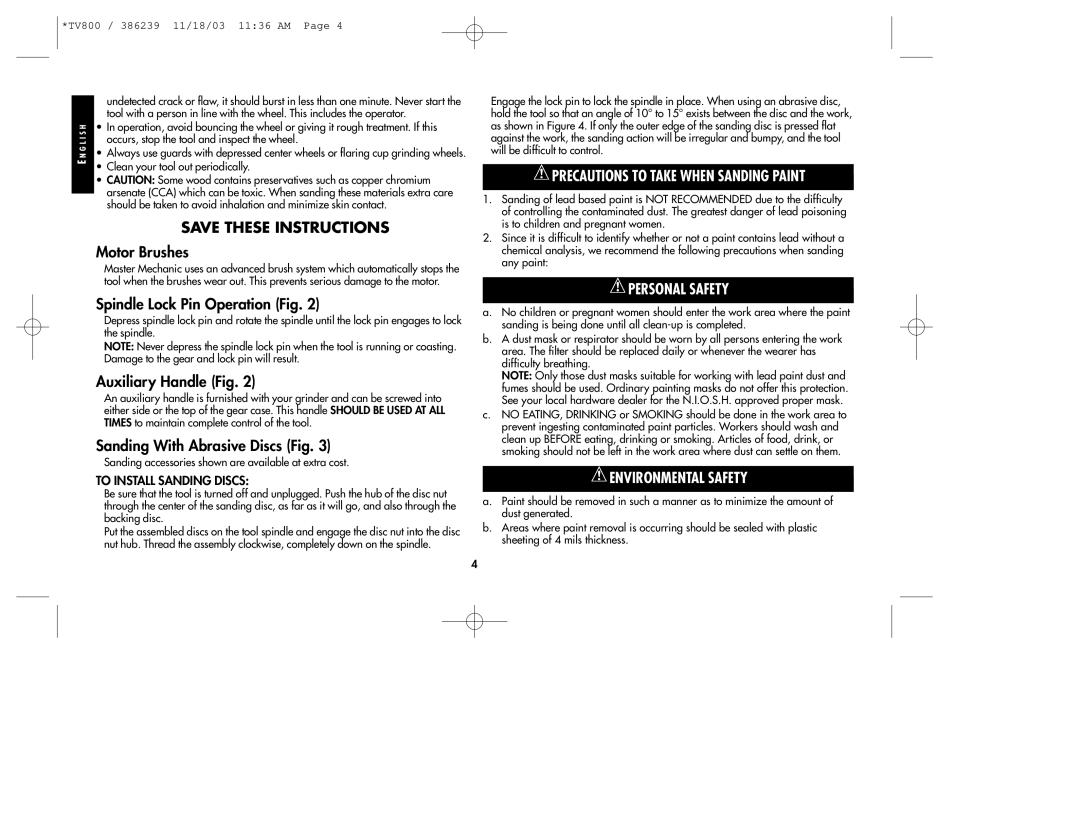
*TV800 / 386239 11/18/03 11:36 AM Page 4
E N G L I S H
undetected crack or flaw, it should burst in less than one minute. Never start the tool with a person in line with the wheel. This includes the operator.
•In operation, avoid bouncing the wheel or giving it rough treatment. If this occurs, stop the tool and inspect the wheel.
•Always use guards with depressed center wheels or flaring cup grinding wheels.
•Clean your tool out periodically.
•CAUTION: Some wood contains preservatives such as copper chromium arsenate (CCA) which can be toxic. When sanding these materials extra care should be taken to avoid inhalation and minimize skin contact.
SAVE THESE INSTRUCTIONS
Motor Brushes
Master Mechanic uses an advanced brush system which automatically stops the tool when the brushes wear out. This prevents serious damage to the motor.
Spindle Lock Pin Operation (Fig. 2)
Depress spindle lock pin and rotate the spindle until the lock pin engages to lock the spindle.
NOTE: Never depress the spindle lock pin when the tool is running or coasting. Damage to the gear and lock pin will result.
Auxiliary Handle (Fig. 2)
An auxiliary handle is furnished with your grinder and can be screwed into either side or the top of the gear case. This handle SHOULD BE USED AT ALL TIMES to maintain complete control of the tool.
Sanding With Abrasive Discs (Fig. 3)
Sanding accessories shown are available at extra cost.
TO INSTALL SANDING DISCS:
Be sure that the tool is turned off and unplugged. Push the hub of the disc nut through the center of the sanding disc, as far as it will go, and also through the backing disc.
Put the assembled discs on the tool spindle and engage the disc nut into the disc nut hub. Thread the assembly clockwise, completely down on the spindle.
Engage the lock pin to lock the spindle in place. When using an abrasive disc, hold the tool so that an angle of 10° to 15° exists between the disc and the work, as shown in Figure 4. If only the outer edge of the sanding disc is pressed flat against the work, the sanding action will be irregular and bumpy, and the tool will be difficult to control.
 PRECAUTIONS TO TAKE WHEN SANDING PAINT
PRECAUTIONS TO TAKE WHEN SANDING PAINT
1.Sanding of lead based paint is NOT RECOMMENDED due to the difficulty of controlling the contaminated dust. The greatest danger of lead poisoning is to children and pregnant women.
2.Since it is difficult to identify whether or not a paint contains lead without a chemical analysis, we recommend the following precautions when sanding any paint:
 PERSONAL SAFETY
PERSONAL SAFETY
a.No children or pregnant women should enter the work area where the paint sanding is being done until all
b.A dust mask or respirator should be worn by all persons entering the work area. The filter should be replaced daily or whenever the wearer has difficulty breathing.
NOTE: Only those dust masks suitable for working with lead paint dust and fumes should be used. Ordinary painting masks do not offer this protection. See your local hardware dealer for the N.I.O.S.H. approved proper mask.
c.NO EATING, DRINKING or SMOKING should be done in the work area to prevent ingesting contaminated paint particles. Workers should wash and clean up BEFORE eating, drinking or smoking. Articles of food, drink, or smoking should not be left in the work area where dust can settle on them.
 ENVIRONMENTAL SAFETY
ENVIRONMENTAL SAFETY
a.Paint should be removed in such a manner as to minimize the amount of dust generated.
b.Areas where paint removal is occurring should be sealed with plastic sheeting of 4 mils thickness.
4
